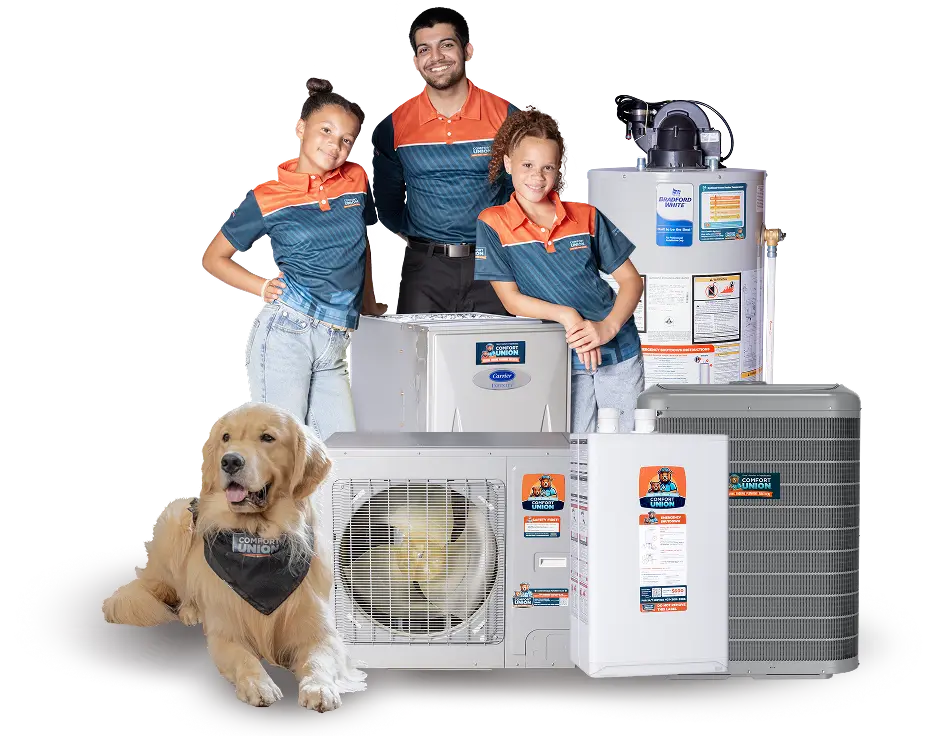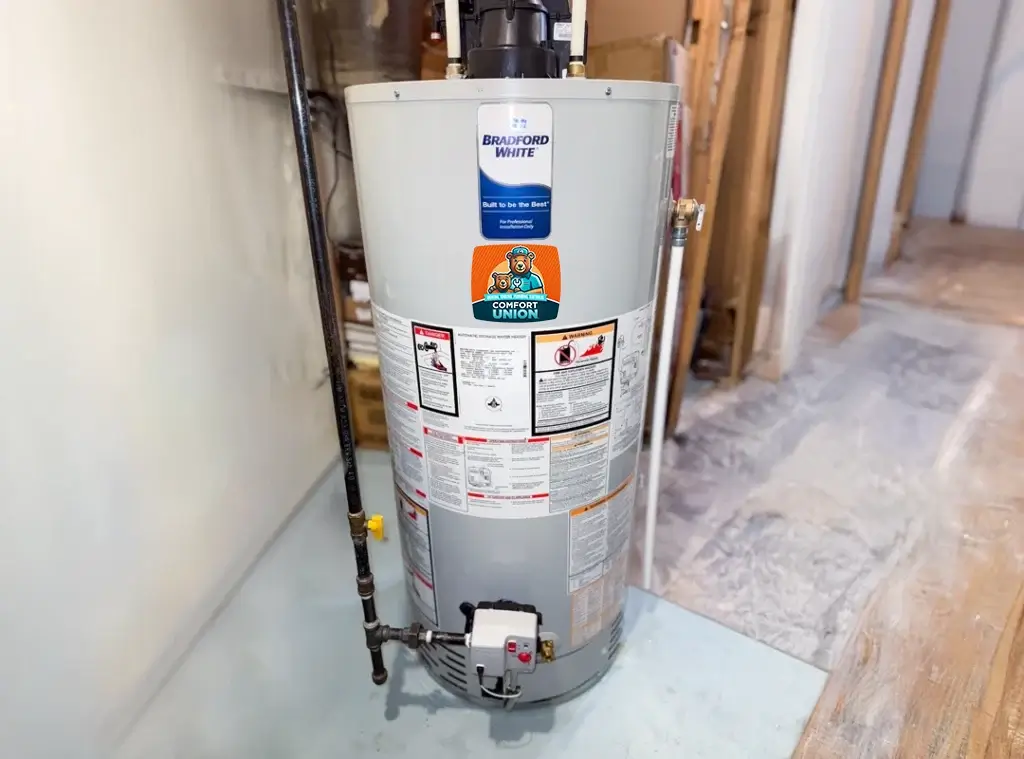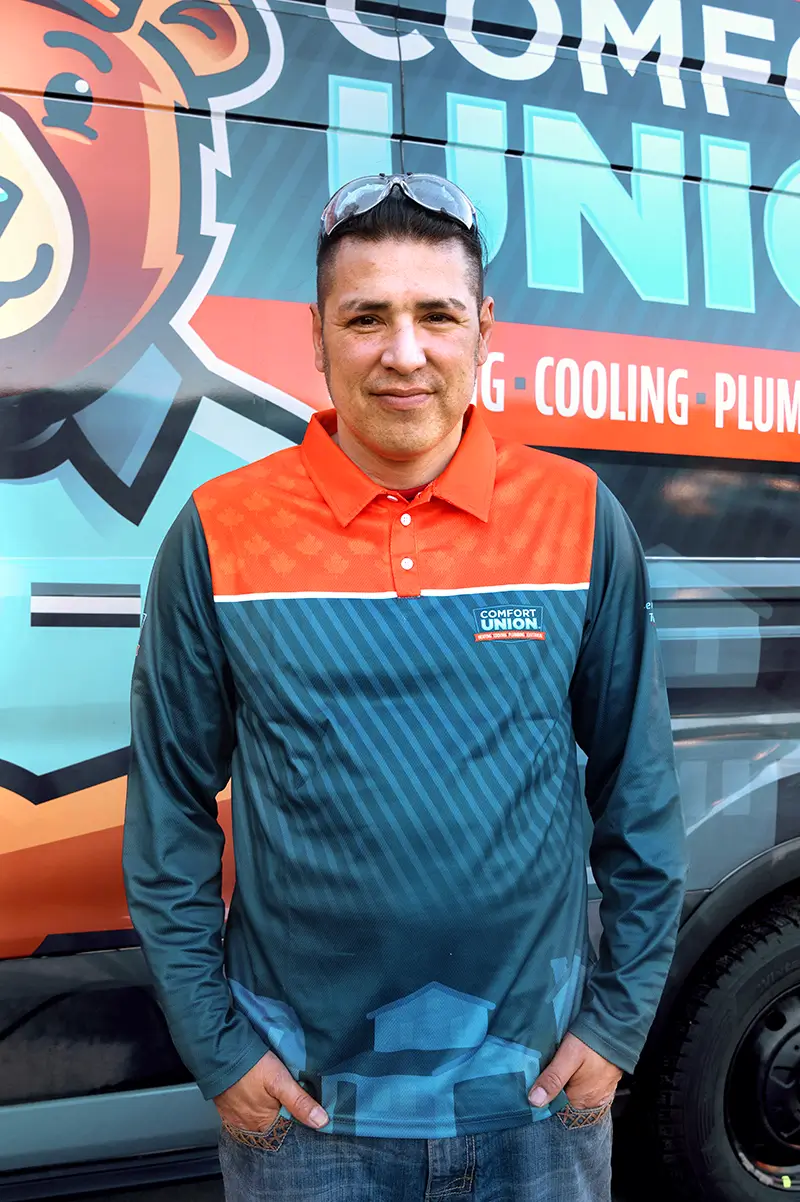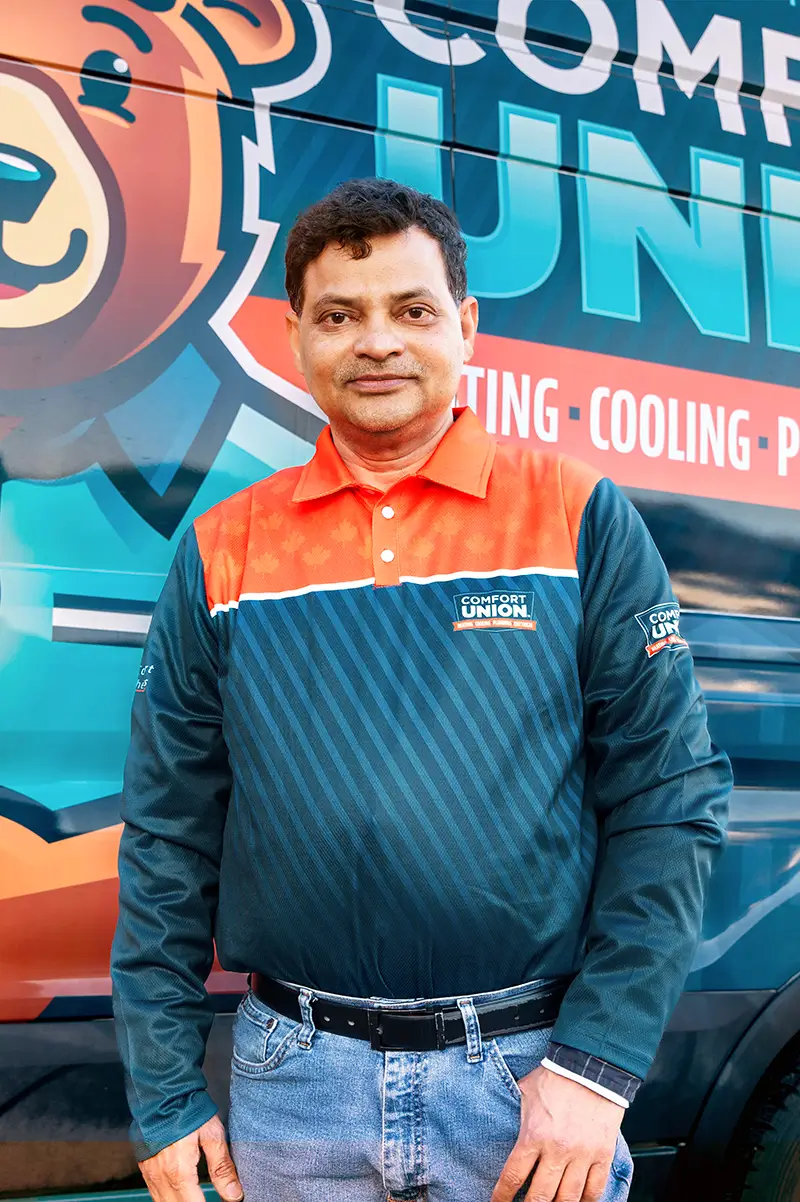If you’ve ever had your hot water run cold halfway through a Calgary winter shower, you know how critical your hot water tank really is. With freezing temperatures that last for months, your tank works overtime to keep showers warm, dishes clean, and laundry running. But how long can it keep up before it needs replacing?
In this guide, we’ll cover how many years a hot water tank typically lasts in Calgary, what factors shorten its lifespan, and how to make it last longer to save you money and frustration in the long run.
Need a New Hot Water Tank?
With Flexible Financing Options
What’s the Average Lifespan of a Hot Water Tank in Calgary?
On average, gas hot water tanks in Calgary last between 8 and 12 years, while electric models can last 15 to 20 years with proper maintenance. The difference mainly comes down to how hard each system works and how Calgary’s conditions affect performance.
Unlike milder regions, Calgary’s cold winters force water heaters to run almost constantly for months. Combined with the city’s mineral-heavy water, which causes sediment buildup inside the tank, most heaters here wear out faster than the national average.
If you’re using a tankless water heater, those typically last 20 years or more, though they require routine maintenance to stay efficient in our hard water environment.
Why Hot Water Tanks Wear Out Faster in Calgary
Calgary’s environment is tough on every part of your home’s plumbing, and water heaters are no exception.
The biggest culprit is hard water, which contains high levels of calcium and magnesium. These minerals settle at the bottom of the tank as sediment, forcing your heater to work harder to maintain the temperature. Over time, this buildup can clog valves, reduce heating efficiency, and even crack the tank lining.
Long, cold winters also mean your water heater runs far more frequently than in warmer cities. And if it’s installed in an uninsulated basement or garage, fluctuating temperatures can stress the metal tank, causing corrosion or leaks earlier than expected.

6 Key Factors That Affect Hot Water Tank Lifespan
So why do water tanks last shorter in our area? Here are some of the key factors:
1. Water Quality and Hardness
Calgary’s mineral-rich water is the number one reason water heaters fail early. Sediment buildup leads to overheating and corrosion. Installing a water softener system can significantly slow this process and keep your tank cleaner for longer.
2. Tank Material and Build Quality
Not all tanks are built the same. Stainless steel and glass-lined models last longer than budget steel tanks. Investing in a quality brand during installation often pays off with fewer repairs and a longer lifespan.
3. Installation Quality
Even the best water heater will fail early if installed incorrectly. Poor venting, inadequate clearance, or improper pressure relief valves can all shorten its life. Always hire certified Calgary professionals for installation to ensure long-term performance and safety.
4. Maintenance Frequency
Routine maintenance is the easiest way to extend your tank’s lifespan. Annual flushing, anode rod checks, and valve inspections prevent buildup and corrosion. Skipping maintenance for years at a time, on the other hand, can easily shave 3–5 years off your unit’s life.
5. Usage Habits
A family of five taking daily showers will put far more strain on a water heater than a single occupant. The more hot water you use, the faster your tank wears out, it’s that simple.
6. Climate and Location
Tanks in cold, unheated basements or garages work harder to maintain temperature and are more prone to condensation and corrosion. Keeping your system in a temperature-stable, insulated space helps extend its lifespan.
Signs Your Hot Water Tank Is Near the End of Its Life
If your tank is more than 10 years old, start paying attention to how it performs. Common warning signs include:
- Fluctuating or lukewarm water temperatures
- Rusty or cloudy water coming from the hot tap
- Popping or rumbling noises caused by sediment buildup
- Small leaks or puddles around the tank base
- Rising utility bills despite the same usage
If you’re noticing two or more of these signs, your tank is likely nearing its end, and waiting too long can risk leaks or total failure.
When to Repair vs Replace Your Hot Water Tank
If your tank is under eight years old and experiencing minor issues, like a faulty thermostat or leaking valve, repair is often the better choice. But once it hits the 10-year mark, replacement becomes more cost-effective, especially if you’re dealing with corrosion, leaks, or repeated breakdowns.
Many Calgary homeowners are switching to tankless water heaters for their longer lifespan and improved energy efficiency. While the upfront cost is higher, they often pay off in savings and reliability over time.
How to Extend the Life of Your Hot Water Tank in Calgary
A little maintenance goes a long way toward getting the most out of your water heater. Here’s how to keep it in top shape:
- Replace the filter or flush the tank once a year to remove sediment.
- Have the anode rod replaced every 3–5 years, as it helps prevent internal corrosion.
- Keep your thermostat between 49°C and 54°C for efficiency and safety.
- Insulate the tank and nearby pipes, especially in unfinished basements.
- Schedule a professional tune-up each year before winter arrives.
Comfort Union’s team offers full hot water tank maintenance and repairs designed specifically for Calgary’s water conditions, helping you stay warm and worry-free all year long.
FAQs Calgary Homeowners Ask About Water Heater Lifespan
How can I tell how old my water heater is?
Check the manufacturer’s label, the first four digits of the serial number usually indicate the year and week it was made.
What’s the best type of water heater for Calgary’s hard water?
Tankless or stainless steel models are ideal, especially when paired with a water softener.
Can regular maintenance really extend the life of my tank?
Absolutely. Annual flushing and part replacement can add 3–5 years to your tank’s life.
Should I drain my tank every year?
Yes, draining removes sediment buildup and keeps your system heating efficiently.
What is the average replacement cost in Calgary?
Most homeowners spend between $1,800 and $3,500, depending on size, type, and installation complexity.
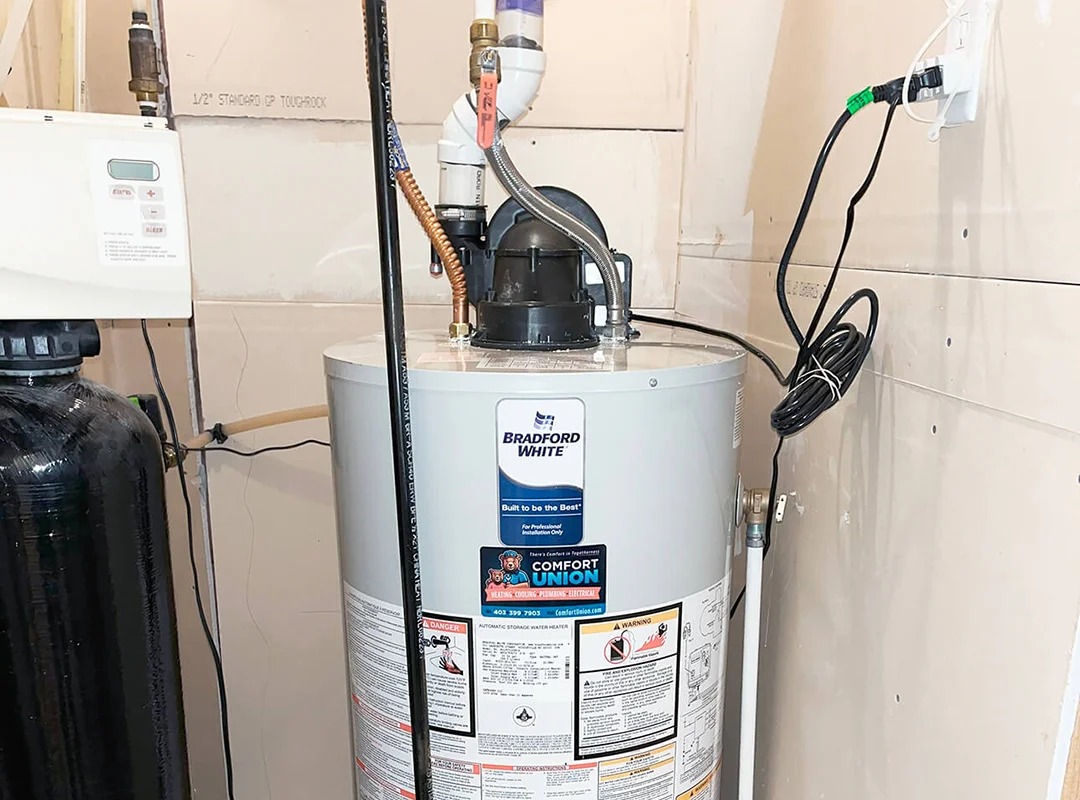
Professional hot water tank installs in Calgary with energy-efficient models, expert setup, and clean workmanship, backed by Comfort Union’s trusted team.
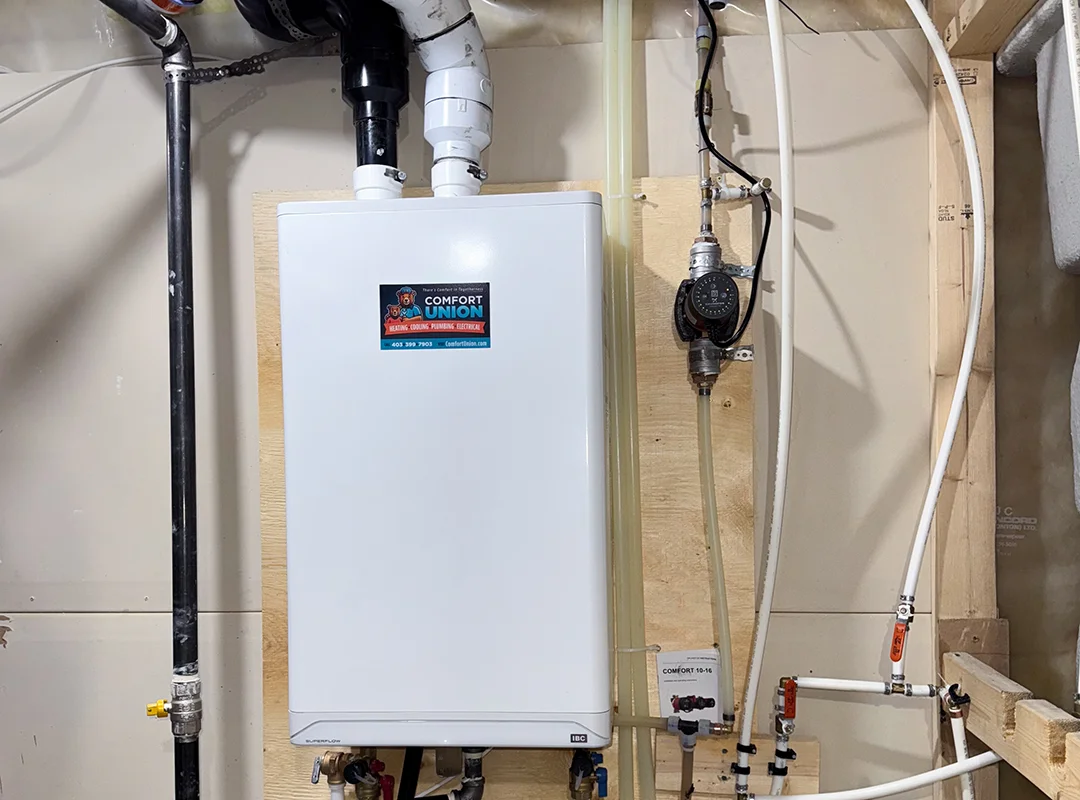
Upgrade to a tankless water heater in Calgary with 24/7 installation service, transparent pricing, and expert HVAC professionals you can count on.
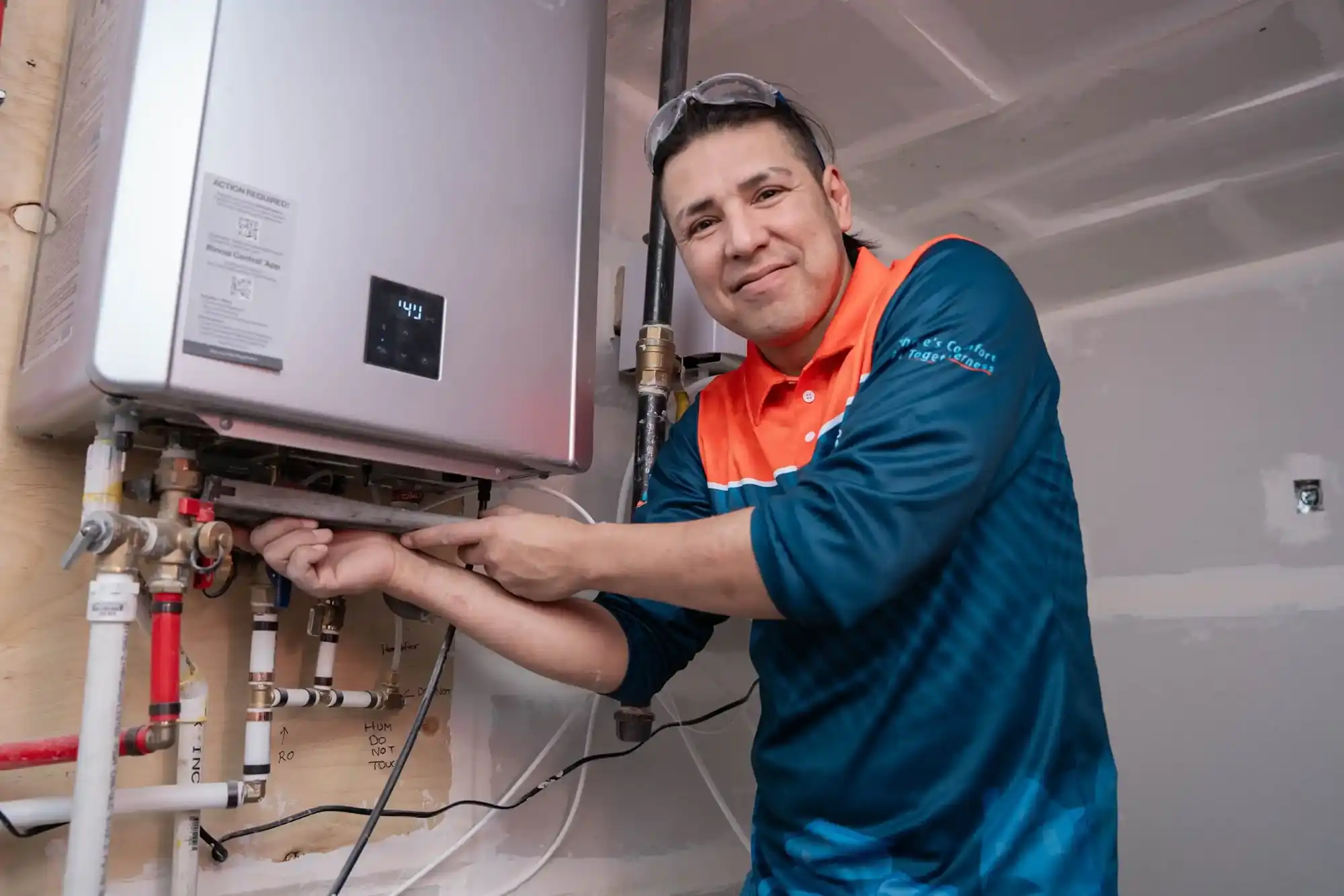
Quick and reliable tankless water heater repairs in Calgary. Get fast diagnostics, honest pricing, and long-term performance from local specialists.
